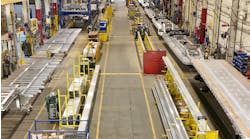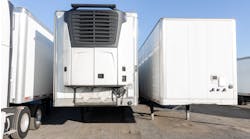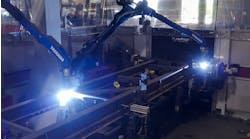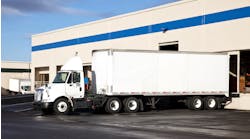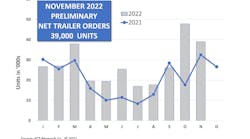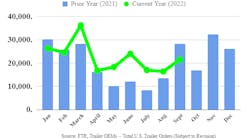Truck trailer production was expected to be down in 2008, but not down 31% on top of a 22% decline the previous year. The net effect is a 46% drop in output during the two-year period of the current recession. That is what a survey of the leading trailer manufacturers shows.
During 2008 the 30 largest trailer manufacturers produced 151,641 complete truck trailers, compared to 218,422 in 2007 and 282,750 in 2006. While the whole group was down 31% in 2008, individual manufacturers were down as much as 50% and 52% in unit numbers. However, three manufacturers actually increased their output.
Ag trailers were especially strong — trailers needed to move corn and soybeans to ethanol and plastics processing plants. Tank trailer manufacturers did fairly well, with petroleum tanks up but chemical tanks soft, and pneumatic dry bulkers down, especially small capacity cement haulers down. Another energy sector also did well — heavy-haul and extendable trailers to move windmill towers and wings. Dry freight van manufacturers were off across the board, along with platform builders, as housing dried up and dry freight shrivelled.
The three largest trailer manufacturers built 56% of the trailers built by this group of 30 builders. The top 10 built 80%.
With the exception of Lufkin Trailers, which announced in January 2008 that it was closing down its trailer operation, this 2008 group of 30 is essentially the same as in 2007. However, Benson was absorbed by Wabash National, the company that had previously bought Transcraft. Even so, Wabash National built enough dry freight vans and refrigerated vans to secure the top position without the addition of the Transcraft platforms and the Benson platforms and dump trailers.
It is important to realize that this ranking of companies by the number of trailers manufactured does not necessarily reflect the relative success of the companies in terms of revenue received and profitability. The dollar value of a trailer can be a different story depending on complexity of design, type of construction, materials used, and quality level.
This list cannot be compared to other production totals of United States plants, for it includes both Canadian and Mexican plants that are included because a large part of their output is sold in the United States.
This Trailer/Body Builders survey is made by telephoning a member of the management team at each trailer manufacturing company. The survey is built on the voluntary contribution of trailer production information at each company. The survey is the work of Trailer/Body Builders editors and should not be confused with any other survey.
-
Wabash National Corporation of Lafayette IN completed 32,094 trailers in 2008, a figure 29.5% lower than in 2007. However, it was enough to secure the top spot as the manufacturer building the largest number of truck trailers in 2008. The total includes 25,458 dry freight vans, down 28%, plus 4,468 refrigerated vans, down 24%. Platform production was down 51% at 2,138 units, built at the Benson trailer plant in Cadiz KY that Wabash bought in July 2008 and the Transcraft plant in Anna IL that Wabash bought earlier. The Transcraft plant in Mt Sterling KY was closed at the end of 2007. The total includes 30 dump trailers, a new market for Wabash. The company also produced 381 converter dollies, but these are not counted in the trailer total.
Wabash CEO Richard Giromini noted that “2008 was a challenging year in a deteriorating demand environment led by continued weakness in the housing sector, worsening conditions in the automotive sector, and a continued tight credit environment. All of these factors have contributed to a reduction in freight, over-capacity in equipment, and a drop in new trailer requirements.”
In an earlier news release on Jan 22, Giromini outlined some of the cost-cutting measures the company has taken: further reductions in salaried associates, bringing to 170 associates or a 25% reduction in the salaried headcount since the beginning of the industry downturn in early 2007; a 10% reduction in base salary for executive officers and the senior management team; a temporary 10% reduction in base salary for salaried associates; and a temporary reduction in the standard workweek from 40 hours to 36 hours.
Unit shipments have fallen dramatically from Wabash's high of 59,400 units in 2006, the peak year of this past cycle. However, Giromini said that the company has gained “significant market share within our dry van business.”
-
Great Dane Limited Partnership built approximately 28,500 truck trailers in 2008. This is 19,500 fewer trailers than in 2007, or down 41%.
-
Utility Trailer Manufacturing in City of Industry CA shipped 22,890 truck trailers, down 25% from 2007. Utility remains the largest manufacturer of refrigerated trailers, even though its refrigerated van output was down 14% to 12,732 reefers. Dry freight vans totaled 8,091, down 35%. Platforms and curtainsider vans were 2,067 units, down 37%. All five Utility Trailer plants remain in operation, although at reduced levels. Craig Bennett, senior vice-president, sales and marketing, thinks the trailer industry may be off another 10% to 15% in 2009 below 2008. Utility is celebrating its 95th anniversary this year.
-
Hyundai Translead of San Diego CA built half as many van trailers as in 2007. Dry freight vans numbered 5,64l, down 52%, and refrigerated vans were 899, down 30%. Total van trailers were 6,540, down 50%. However, container and chassis production was up. The company built 2,272 domestic containers, up 69%, and 5,820 container chassis, up 33%. The number of van trailers added to the domestic containers numbers 8,812 total “boxes” produced by Hyundai Translead in 2008, down 38% from 2007. The total number of “units” including 600 converter dollies, was 15,232, down 22%. The factory for Hyundai Translead is south of San Diego across the border in Tijuana, Mexico.
-
Stoughton Trailers LLC in Stoughton WI produced 5,482 van trailers in 2008, down 52% from their 2007 level. CEO Don Wahlin says they prepared for the expected downturn by instituting a hiring freeze in September 2006 to reduce workforce by attrition. Two plants were shut down in 2008. The headquarters plant in Stoughton is now on reduced hours of 36 hours per week (four nine-hour days) for the single shift. Since last fall, the plant closes down the fourth week of every month. “The trailer industry is known for its deep cycles,” says Wahlin, “but this is the deepest recession since we started building trailers 40 years ago.”
-
Vanguard National TrailerCorp in Monon IN built 4,346 dry freight van trailers, down 30% from 2007. Until a backlog builds, the company is currently (in January) working one week and off the next week. “We have reorganized down to our core and are going forward,” says Charles Mudd, president. “We have the full support of our parent company, CIMC, but haven't needed their help so far. We are supported internally by our own solid balance sheet.” He says quote activity remains good.
-
MANAC in St Georges, Quebec, shipped 4,150 trailers from its two Canadian and one United States plants, according to Charles Dutil, president/CEO. This was 1,450 trailers fewer than in 2007, down 26%.
-
Trailmobile Canada Ltd in Mississauga, Ontario, built 4,090 van trailers, down 28% from 2007. Bert Clay, VP sales and marketing, says that sales and production had slowed gradually throughout the year, but the precipitous drop in the economy came later than in the United States. On January 15, 2009, Trailmobile Canada filed for reorganization under Canada's bankruptcy laws.
-
Heil Trailer International of Chattanooga TN produced 4,000 units in 2008 “with solid performance from all segments, commercial, military, and international,” according to Jessica Greene, communications manager. That figure puts it down 16% from the 4,750 reported last year. Production is from U.S. tank plants in Athens TN and Rhome TX and a Kalyn Seibert lowbed trailer plant in Gatesville TX, as well as international tank trailer plants in Argentina and Thailand.
-
Strick Corporation's three plants in Monroe IN, Berwick PA, and Sumpter SC produced 3,574 trailers, including some Cheetah chassis, in 2008. Chairman Frank Katz has changed the company completely around regarding both products and customers. While dry-freight vans are still the company's largest product group, the dry-freight vans that Strick has been producing are not the standardized vans built on high-volume assembly lines for for-hire fleets. Instead, they are customized trailers with lots of individual options such as side doors, tailgate lifts, dropdecks, etc, the kind of trailers that private fleets buy. “We are even coming out with a furniture moving van in 2009,” says Katz. All three plants are still on their traditional work week of four 10-hour days.
-
Wilson Trailer Company manufactured an estimated 3,500 livestock, grain, and platform trailers in 2008.
-
Fontaine Trailer Company in Haleyville AL produced 3,315 truck trailers, down 54% from 2007. The good news is that the higher dollar lowbeds and heavy haul trailers were up 28% to 921 lowbeds. Platforms and military trailers were off 63% to 2,394. The company is using this slow period to complete work on some new trailers, notably the recently introduced “Revolution.” It is an all-aluminum platform incorporating many new manufacturing techniques and user benefits. Buck Buchanan, VP sales and marketing, says it has been in fleet testing for the past two years, and now will go into full production in April.
-
Trail King Industries Inc in Mitchell SD shipped 3,289 truck trailers, plus several hundred tag trailers, down 13% from 2007. This includes 2,519 lowbeds and heavy-haul trailers, 541 dump trailers, and 229 pneumatic tank trailers. Not counted in these truck trailers were 271 tag trailers with lighter axles, making the grand total 3,560 trailers.
-
Timpte Inc in David City NE is one of the few truck trailer manufacturers to actually increase production in one of the trailer industry's worst recessions. It produced 3,250 new trailers, an increase of 8% over 2007, plus another 200 refurbished grain trailers. Timpte specializes in grain trailers for corn, soybeans and other bulk commodities, which have been trading at record high prices. However, the fourth quarter of 2008 and first part of 2009 have been slower, prompting a 13% layoff. Dale Jones, president and CEO, says the company does not expect 2009 to be as good, even though it is still running a partial second shift.
-
Polar Tank Trailer of Holdingford MN produced 2,209 tank trailers, down 11.7% from 2007. Chemical and crude oil transports were the strongest markets, but petroleum trailers were down 20% from the previous year. The company is bracing for further declines or a flat market in 2009, says John Koll, VP sales and marketing, unless the economic stimulus package gets road building started early. The good news is that with declining oil prices, state budget dollars will lay a lot more miles of asphalt. Meanwhile, the company is using the slowdown to engineer some new products. With a complete line of stainless, carbon steel, and aluminum tankers for liquids and pneumatic dry bulkers, Polar also has one of the largest networks of service centers. The company is working to expand beyond the present 17 company-owned service centers.
-
Walker Group Holdings combines the tank trailer production of Brenner Tank LLC of Fond du Lac WI, Walker Stainless Steel of New Lisbon WI, and Progress Tank of Arthur IL. John F Cannon, VP sales and marketing of Brenner, reports that the Walker companies built 2,200 units, down 3.5% from 2007.
-
MAC Trailer Manufacturing in Alliance OH produced 2,191 truck trailers, down 17% from the 2,643 in 2007. Like most trailer companies, MAC had good production for the first three quarters, then a bad fourth quarter and worse January 2009. The company's new aluminum extendable frame platform helped improve the sales picture somewhat. This year MAC is entering another new market — aluminum dry bulk tankers. Michael A. Conny, president, says the first MAC pneumatic tank trailer will be on display at the Mid-America Trucking Show in March.
-
Road Systems in Searcy AR increased its total trailer output almost 8% in 2008 by turning out l,870 vans, including both new and refurbished trailers (newly manufactured box on rebuilt axles). This includes 778 short doubles trailers and 1,092 long vans.
-
XL Specialized Trailers Inc in Manchester IA had an outstanding year, setting a new record for the 14-year-old firm specializing in heavy-duty transport trailers such as lowbeds, detachable gooseneck, extendable frame, tilt bed, and sliding axle heavy haulers. The company built 1,821 total trailer units. This is a 62% increase over its 2007 output. One area of growth is the wind generation industry, hauling the huge tower sections, wings, and generators.
-
Reitnouer Inc in Reading PA had a good year for the first three quarters, building at the rate of 35 to 40 platforms a week. At the end of September it had a 10-week backlog, and even saw a slight up-tick in demand. However, after the bad economic news hit, the backlog was soon gone. In January the company was down to a skeleton crew, the other workers being on temporary layoff. Even so, Bud Reitnouer says his market share is holding steady in the national market for all-aluminum flats and drop-decks. Reitnouer finished the year with 1,504 total trailers, down 24% from 2007. The R & D staff is working on some new trailer designs to diversify the company away from the deep cycling platform market.
-
Pitts Trailers reported a 22% decline in trailer shipments to 1,417 truck trailers. This production includes output from three plants: the headquarters plant in Pittsview AL, Dynaweld in Columbus GA, and the first full year of production from the Dorsey Trailer plant in Elba AL. Looking ahead in 2009, President/CEO Jeff Pitts says he sees a significant increase in quote activity and much greater optimism.
-
Talbert Manufacturing Inc in Rensselaer IN reported 1,239 trailers shipped in 2008, down 12.4% from 2007. About half of these were commercial lowbeds and platforms, and half were produced on a military contract. With this stabilizing influence, Talbert is looking for a good year in 2009, even a little better than 2008, says Stephen Kingman, executive vice-president.
-
East Manufacturing Company in Randolph OH shipped 1,235 all-aluminum platforms, dump trailers, and transfer trailers, down 24% from 2007. The only good news, says David Tate, president, is that aluminum prices have come down with the floundering markets. He sees a possible hope for optimism if the government stimulus includes investment in the infrastructure, particularly road-building. The aluminum dump trailer is a staple of the East line.
-
Doepker Industries Ltd in Anaheim, Saskatchewan, built 1,200 trailers, down 40% from 2007. The company builds a wide range of trailers, but most markets were down — dump trailers, platforms, logging and oilfield equipment. But the agricultural market was good, especially grain trailers. Bill Schuler, VP sales and marketing, says that sales will probably decline again this year, perhaps to the 800 to 1,000 level.
-
Kentucky Trailer in Louisville KY reported 1,069 trailer shipments, down 29% from 2007. Kentucky specializes in custom van trailers for the moving industry, which has been hard hit by the housing crisis. The company had already started diversifying over a year ago with the purchase of a company in Walled Lake MI specializing in auto transport vans (now also soft) and expandable vans used by government bodies as command centers, in disaster relief, and as mobile training centers. Kentucky Trailer thus builds the trailer shells that Kentucky Trailer Technologies modifies and equips for high-dollar technology vans. The company is also expanding into truck bodies for the moving industry. A 24-ft long prototype will be introduced at the moving industry convention this month in Dallas TX. But the biggest change is that the company is using the down cycle to gear up for the next up-cycle. Kentucky Trailer, which was founded in 1870, has sold its outdated plant in central Louisville to the University of Louisville, and is building a new 260,000-sq-ft plant in a nearby industrial park.
-
Kidron built 1,060 refrigerated distribution trailers, a 19% decline compared to 2007. It closed its Tulare CA plant, leaving the company with three refrigerated trailer and truck body plants: Montgomery PA, Lakeland FL, and the headquarters plant in Kidron OH. Additional investment was put in the Montgomery plant by adding another line for trailers.
-
Beall Corporation in Portland OR built 946 truck trailers, plus 270 truck bodies for mounting on truck chassis used in doubles trains, for a total of 1,216 cargo units. Pneumatics and dumps were down sharply, but petroleum tanks fared very well, even increasing slightly in some sectors. “Beall is known as a custom builder,” says Daniel Jarboe, vice-president of marketing, “and our custom stuff was holding its own better than the standard line.”
-
Tremcar Inc of St-Jean sur Richelieu, Quebec, was on par with 2007 for the first half 2008. Everything slowed down dramatically after the fall of petroleum in July. At the end of the year, the company was down only 8% to 842 tank trailers. However, Daniel Tremblay, president, is forecasting only 750 tank trailers in 2009.
-
Western Trailer in Boise ID produced 694 truck trailers, down 32% from the 1,016 trailers in 2007. As might be expected, the agricultural trailer sales held up better than the platforms in this difficult year.
-
Doonan Specialized Trailer LLC maintained a reasonable level of production by purchasing another platform trailer manufacturer. In late June Doonan purchased the assets of Chaparral Trailers, an all-aluminum platform manufacturer in Mound Ridge KS, and moved its equipment 70 miles to the Doonan 90,000-sq-ft plant in Great Bend KS. Doonan continues its highly customized steel and steel-aluminum combo platforms in addition to the new aluminum line. Co-managers Mike Gordy and Elgen Reynolds say Doonan had its highest production level in the fourth quarter of 2008. Total for the year was 608 trailers, down 15% from 2007.
-
Travis Trailer Co in Houston saw a gradual progression downward in its output of aluminum dump trailers, finishing the year down 37% at 516 total end dumps, bottom dumps, and transfer trailers. One assembly line was shut down, Hurricane Ike closed the plant down for 10 days in September, and staff was reduced, but the company is still working 40 hours a week, says Bud Hughes, sales manager.

